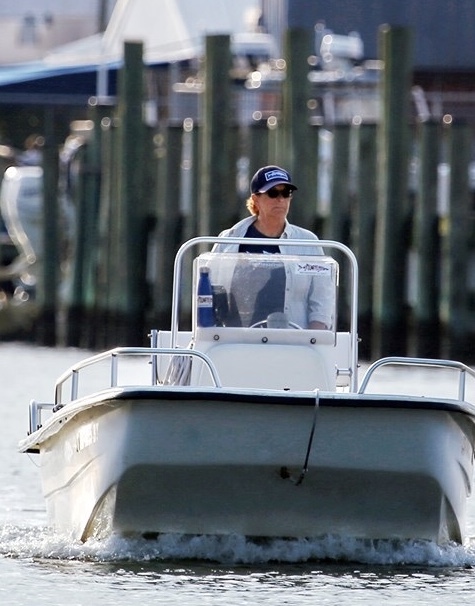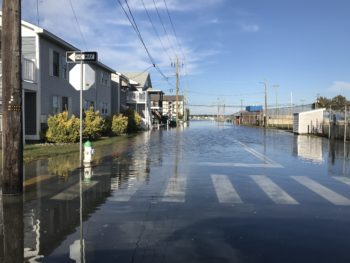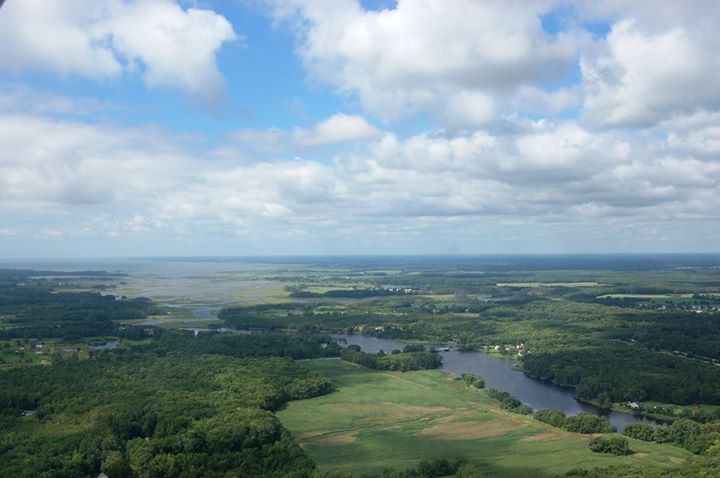Who is Waterkeeper: Kathy Phillips, Assateague Coastkeeper
By: Thomas Hynes

Kathy Phillips has been the Assateague Coastkeeper in the coastal watersheds of Maryland and Virginia’s Coastal Bays watershed for going on 14 years. The area boasts tremendous variety, as it is both close to the Atlantic Ocean as well as the back bays behind Ocean City, MD, and the Assateague Island National Seashore. This allows for tranquil kayaking, offshore deep sea fishing, and just about everything in between.
Phillips says she has always loved the water. Prior to her role as Coastkeeper, she ran amateur surfing competitions in nearby Ocean City, MD for years. She herself is a surfer, as well as a kayaking and sailing enthusiast. Growing up, she spent most warm weekends in a sailboat with her father on the Chesapeake Bay. “It was like my whole life had been leading up to me becoming a Waterkeeper,” says Phillips.
It was this lifelong love of water that alerted Phillips to the changing conditions locally. She could literally see the difference in water quality, growing murkier over the years. Though she could also see the difference in quantity — which is to say she began to see more and more water, usually arriving in her front yard, because of an increase in flooding. The rise in sunny-day flooding in nearby Ocean City was also concerning.

“It’s amazing to see the difference in the time we’ve lived here,” says Phillips, who cites her and her family’s love for the community as a reason for getting more involved. “We liked the area. So we said, ‘Ok let’s try to keep it that way.’”
Like so many watersheds around the world, Phillips sees her fair share of ecological threats and other obstacles. She cites common things like aging septic systems and overdevelopment as problems. But there is also the local poultry industry to consider.
“We don’t have a major coal-burning plant,” says Phillips. “Concentrated Animal Feeding Operations (CAFOs) and chicken manure is the biggest fight in this watershed. No other environmental organization on the Lower Shore will stand up to these polluters except Waterkeeper.”
Recently, a Maryland state court sided with Phillips and Assateague Coastkeeper in deciding to control CAFO ammonia emissions from poultry producers. “Communities on the Lower Eastern Shore of Maryland can breathe a sigh of relief (literally) knowing Maryland clean water regulations will now better protect the water they drink and the waterways they fish and recreate in,” says Phillips. “This ruling will work to protect watershed communities, including those communities facing environmental injustices, who will see improved water quality and the co-benefit of reduced air pollution.”
Nearby Ocean City, MD also poses a lot of problems. Be it the hardening of bayside shorelines, which typically replaces marshlands or other shallows with things like boardwalks, or storm runoff from miles of paved surfaces, this highly developed resort island stands in stark contrast to nearby Assateague Island, which is protected from development and appears a lot closer to how this area looked just a few hundred years ago. Phillips likes to take trips in the coastal bays along Assateague Island and down toward Chincoteague Bay. Seeing this beautiful and unspoiled landscape motivates her to keep fighting to protect this natural resource. Though, she definitely also enjoys the occasionally confrontational nature of the work.

“I love being a Waterkeeper because I’m the one who speaks truth to power and I really get to poke the finger in the chest of government agencies that aren’t doing their job,” says Phillips. “I’m speaking on behalf of the people who live here and I’m speaking for the waterway.”
Phillips also strongly believes in the power of citizen activism. It was this kind of environmental advocacy and action in her Delmarva coastal region that led Assateague Island to receive its National Seashore designation in the 1970s.
She encourages those looking to get more involved, either in her area or elsewhere, to get on a mailing list, attend a meeting, or even visit their local library. She also suggests getting out on the water in order to remember what’s at stake in this work. For her, talking to other Waterkeepers is also very helpful.
“We all learn off each other. It’s the collaborative, bottom-up approach to Waterkeeper Alliance that makes it so unique,” says Phillips. “Fred Tutman, the Patuxent Riverkeeper, is such a mentor to me. There’s a lot of other Waterkeepers that really helped to inspire me. That’s why it’s so important to get in there face to face with other Waterkeepers. ‘Oh you’re having the same problem I’m having.’”
To Phillips, this is what makes Waterkeeper Alliance unlike other national environmental organizations. Information, expertise, and knowledge is gathered and shared from those in the field… Or better yet, from those on the water.